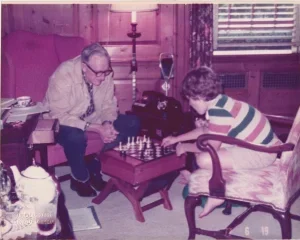Why John D. Rockefeller III?
PLAYING CHESS WITH MY GRANDFATHER

Fast forward 30 years to 2008. I’m married with 3 young children and living in Baltimore, Maryland. One day my daughters and I played what might have been our 500th game of Connect 4. Connect 4 is a superb game for young kids, but older kids (and their parents!) ultimately lose interest in it. Clearly, it was time for us to find a new game. I thought of the picture of my grandfather and me (which was now in my living room) and decided to give chess a try. In the early 1980s Mattel Computer Chess was my constant companion. But by 2008 I hadn’t played chess in 25 years and wasn’t sure I could remember how all the pieces move. I doubt I remembered the king could castle queenside, and I certainly didn’t remember what en passant is. But I soon fell back in love with chess all over again. Within days a friend and I started planning a chess club at our daughters’ all-girls school, and within 2 months I competed in my first tournament—at the ripe age of 39. (In my second game, I pulled off an upset win against a 1500 player: a smother mate in 10 against the Caro-Kann. But ever since, I’ve been unable to climb back to my first US Chess rating…) 3 years later, as my daughters and I walked to school in the mornings and back from chess club on Monday afternoons, we took turns calling out the moves to Cheron vs Jeanloz (1929), Waitzkin vs Waitzkin (1983), Morphy’s Opera Game (1858), and Reti vs Tartakower (1910). Several years later I also coached chess clubs at my son’s school—culminating in 10 years of coaching. All of which goes to show: mediocre players can be decent coaches, as long as they’ve got passion for the game.
Currently I am Chair of US Chess’ Development Committee, a Maryland Delegate to US Chess, and a member of US Chess’s Scholastic Committee. Since 2010 I have been Scholastic Director of Maryland Chess and the Tournament Organizer and Chief Tournament Director of nearly 200 US-Chess-rated scholastic tournaments—and my kids have competed in almost all of them. When I’m TDing at a tournament, I love seeing parents and grandparents walk their children and grandchildren to the board for the start of a game. I wish my grandfather had lived long enough to take me to what would have been my first chess tournament in the late 1970s. I volunteer my time and donate to US Chess and MD Chess, because chess is a wonderful way for families to connect.
REVIEW – HUMOR IN CHESS
The authors are donating the profits from this book to the four scholastic invitationals (Denker, Barber, Haring, Rockefeller) so we gladly offer this review by Rachel Schechter here.

Beat the Covid-19 Blues with Humor in Chess, written by Dewain Barber, coauthored by Ralph Bowman. This warm, witty collection of chess jokes, quips, riddles, and anecdotes wins guaranteed grins and heartfelt chuckles. Drawing from 50+ years of experience, The Dean of Scholastic Chess has compiled a first-class compendium of wry one-liners, droll cartoons, and tongue-in-cheek chess tales that entertain and instruct—with a modest homespun wisdom sure to appeal to all manner of stripes (squares?) in our vast chess community.
Humor in Chess’ seven chapters offer something for everyone: Scholastic Coaches’ Stories, Player Stories, Chess Peace Cartoons by super talent Tony Sullivan, Tournament Director Stories, Tournament Organizer Stories, Denker and Barber Tournaments and Chess Vendor Stories. Over and again, innocence meets experience, striking an unique quirky balance. My personal faves include:
Chess Pasta, Chess Changes Lives, Never Give Up, True Story, Super Powers, Proper Words, Sunil Who?, Hand Made Chess Boards and Don’t Lose Your Head.
The international array of chess players, personalities, and circumstances we encounter in Humor In Chess is impressive—as is the homage Mr. Barber pays to Bernard Morrison and Arnold Denker among others, reminding us in Even GMs Start Somewhere Else that “it’s not where you are, it’s where you are going.”
Equally impressive are the Humor in Chess contributors, among them: Mike Atkins, Arnold Denker, Jim Eade, Alex Fishbein, Maureen Grimaud, Tim Just, Mike Klein, Shelby Lehrman, Mike Lennox, Chris Merli, Elliot Neff, Frank Niro, Garrett Scott, Ryan Velez, Suni Weeramantry and of course, the Duchess, Susan Barber.
Reviewed by Rachel A Schechter, Chess Instructor
US Chess 2019 Delegate
Downstate VP Illinois Chess Association
Education Consultant, Chess in Schools.us
Treasure Chess Affiliate, Owner

